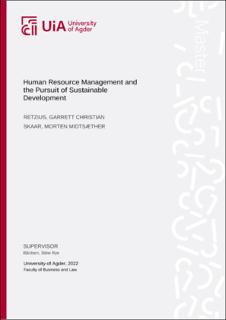| dc.description.abstract | Purpose: This master thesis aims to identify how Human Resource Management may influence an organizations sustainability activities, where the main focus is on the early stages of employment, from recruitment and selection to onboarding.
Theory: The theory is based around the topic question “What is the role of Human Resource Management in self-proclaimed green organizations?”, and discusses topics such as Sustainability, Human Resource Management, Organizational Culture, The Recruitment Process, and Onboarding.
Design/methodology/approach: This thesis is exploratory as we try to produce introductory ideas about recent developments in the business world. It is also set up according to the qualitative method, as we are looking for a holistic understanding of the phenomena we study. The data was collected through qualitative, semi-structured digital interviews with three different informants, from three large Norwegian organizations.
Findings: Our main findings were: The main focus of our informants when it comes to sustainability lie in reducing the organization's environmental pressure, while also having a focus on equality. We saw indications that the reason behind this may be to gain a competitive advantage over their competitors. Furthermore, we saw that HRM may have an impact on the sustainability work in organizations, both via how the organization is structured and how the goals are communicated with the employees. Our findings also indicate that the organizational culture may influence the sustainability activities of organizations, and that it is important to have clear roles and good communication within the organization. We saw indications that even though sustainability is not emphasized during the recruitment process, it is an important step for the sustainability culture in particular. We also saw indications that the most important parts of the onboarding process are to build affiliation, a social network, and provide an insight into the organizational culture. We therefore conclude that human resource management may have an impact on the sustainability work in an organization.
Future research: Future research should focus on how a change in leadership can influence HRM in an organization, how different generations look at the topic of sustainability, or expanding our research by increasing and diversifying the sample size.
Key Words: Human Resource Management (HRM), Strategic Human Resource Management (SHRM), recruitment, onboarding, organizational culture, sustainability, Sustainable Development Goals (SDGs) | |
